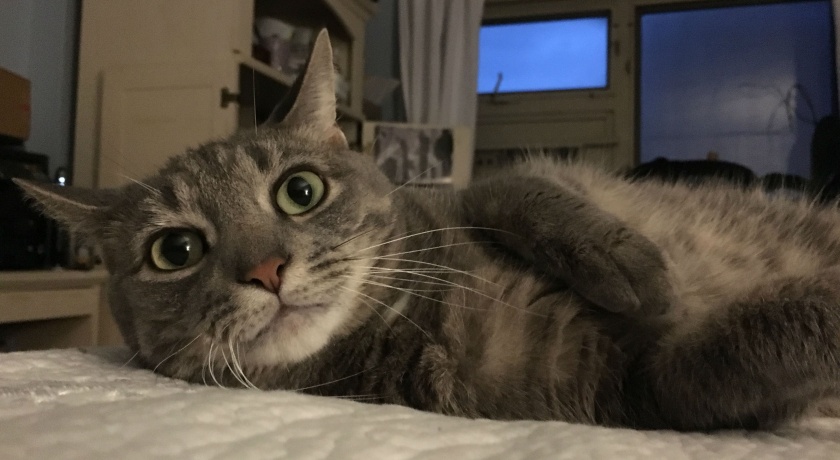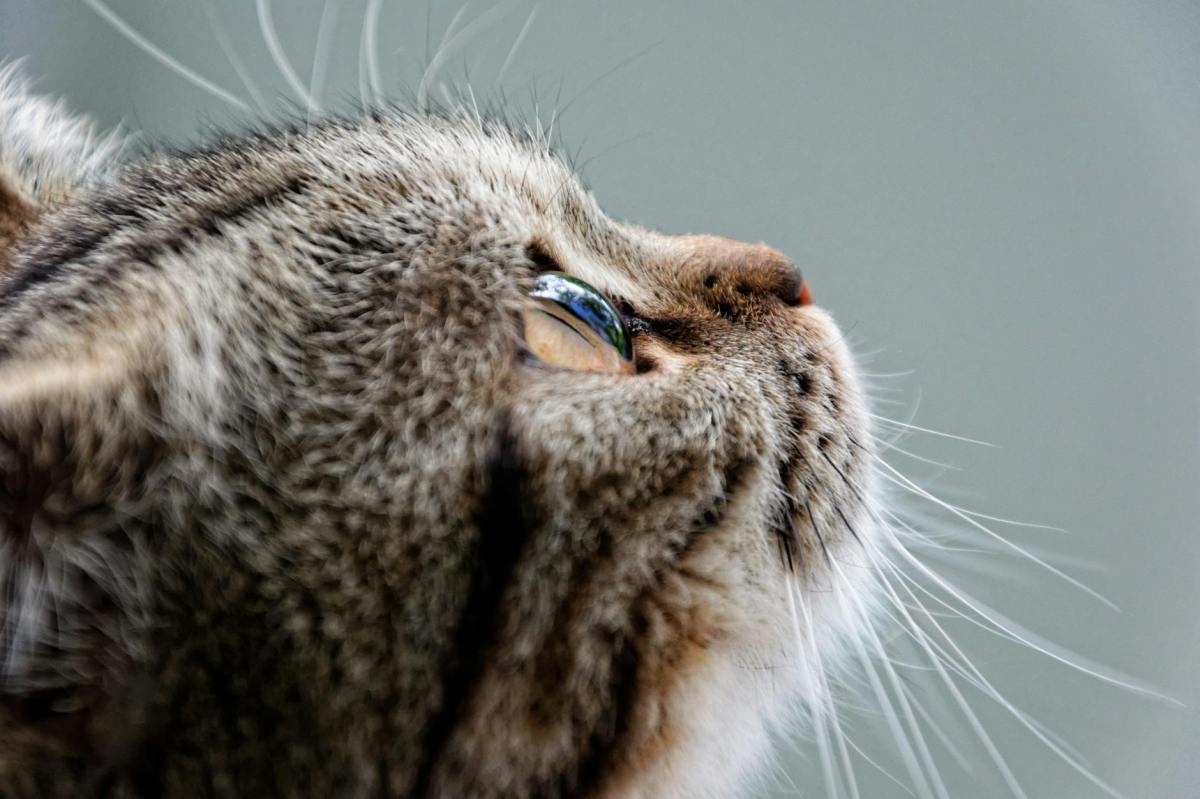The headline — ‘My Boyfriend Said He’d Save Our Cat but Not a Stranger if Both Were Drowning’ — comes from the New York Times via its Ethicist column, in which NYU philosophy professor Kwame Anthony Appiah answers questions from readers about moral rights and wrongs.
Here’s the full text of the question:
My boyfriend and I were talking about protecting human life, and he said that he doesn’t believe that human life is necessarily worth more than any other kind of life. For example, he said that if one of our cats were drowning next to a human who was a stranger to us (who was also drowning) and he could save just one, he would choose our cat. Is this morally wrong?
Appiah, in his very first sentence in response, regretfully calls pets “fictive kin” before pointing to a study by an experimental psychologist in which participants were asked whether they’d save their pets or a foreign tourist if both stepped in front of a bus at the same time. Forty percent of respondents picked the pet.
To his credit, Appiah notes the people who chose their pets don’t have “some grave defect of character,” and said the impulse to save a companion pet is “very human,” given all we share with our animals, including “affection, companionship, loyalty, all twined around a whole lot of memories.”

That said, Appiah says human life is more valuable:
“But yes, it’s very wrong. (In states with “duty to rescue” laws, it could be illegal too.) Those human strangers? They had rich emotional lives and they had plans, short-term and long-term, big and small; it’s a good guess that they were also part of other people’s plans, other people’s emotional lives.”
I’m not going to get into the question of whether human or animal life has more value. That’s a mine field, I don’t subscribe to the idea that we should work out hierarchies of life’s value as if we’re ranking favorite ice cream flavors, and it seems to me these “what if?” questions involving oncoming buses or trains don’t have much value in gauging reality.
After all, how many people do you know were forced to make life or death decisions in a millisecond, let alone decisions involving a complex moral and emotional calculus? Appiah seems to agree, while also pointing out that what people say in a questionnaire doesn’t necessarily predict what they’d do in the moment.
Life is life. It’s all valuable, and the survey doesn’t have much use outside the classroom or ethics columns.

However, I do think it’s worth pointing out that much of what Appiah assumes is the difference between human and animal life — particularly rich emotional lives, cognition and value to others — can indeed be attributed to animals.
There’s been a seismic shift in the way most scientists view animal cognition over the past decade, and in many ways the acknowledgement of non-human sentience and potential sapience is long overdue — there are literally thousands of studies confirming animals are conscious, sentient, and possessed of the full range of primary and secondary emotions.
Every time we set new barriers for what distinguishes human from non-human, we’re forced to change the goalposts. When behaviorism was the dominant model, the distinction was internal thought processes. In dismantling behaviorism, Noam Chomsky helped launch the cognitive revolution. Then it was emotion and love, which crumbled with the ugly Harry Harlow studies into maternal deprivation in monkeys. Then it was capacity to reason, tool use, innovation — and every time, we’ve revised our definitions, solid in our conviction that we’re fundamentally different.
In fact, the only thing that’s held up is Charles Darwin’s original observation in 1871 that “the difference in mind between man and the higher animals, great as it is, certainly is one of degree and not of kind.”
In other words, humans aren’t some higher order of being. We are animals. Upjumped animals in some sense, but animals all the same, subject to the same diseases, physical limitations and helplessness in the face of greater forces like nature.
We may live in an age when our planet is blanketed in satellites, scientists are on fusion’s doorstep and each one of us has the entire sum of our species’ knowledge at our fingertips, but it’s shocking how quickly the veneer of civilization can collapse when people are scared, the food runs out, social order breaks down and those primal motivations — the ones we think we’ve out-evolved — drive our actions again. The early days of the COVID pandemic was just a small reminder of that.
We don’t like talking about these uncomfortable truths because they lead to more uncomfortable truths about the billions of non-human minds we share the planet with, and how we treat them.
I can’t claim to be a philosopher, although I minored in the subject over the objections of my advisor. (He should have warned me off journalism!) But when it comes to animal cognition I do have a great teacher, an 11-pound ball of fur who won’t let me forget he’s got his own wants, needs and strong emotions. Doesn’t he deserve consideration too?


I wouldn’t give it a second thought – my cat would come first. Always. In fact, if there were a choice between an unknown cat and an unknown human, the cat would come first. I wouldn’t even give it a second thought. Feck “duty to rescue” laws. (If only I could swim…)
LikeLiked by 1 person
I can’t envision a scenario in which Buddy would voluntarily go anywhere near a body of water, so I think I can cross that one off the list. I don’t have to worry about anyone throwing him into a body of water either. One does not simply throw tigers into water, as Sean Bean would say.
LikeLiked by 2 people
I always said i would save an animal before a human and don’ t give an eff what anyone thinks of my choice or m.
LikeLiked by 2 people
Excellent piece. I have long believed in the full equality of our fellow Earthlings with us. I to have a couple of fellows that demonstrate this to me on a daily basis ! – Both Bella and Bertie clearly have mastered the emotion of manipulation and are exceptionally good at it when it comes to food
LikeLiked by 2 people
I think Bella might be a feline supremacist. Bertie seems for more chill lol.
LikeLiked by 1 person
A great summary of them both and their characters!
LikeLiked by 1 person
Fascinating essay, lots to think about. My mantra is “animals are people too”, and I treat them accordingly.
LikeLiked by 3 people
A good mantra, and one that avoids the pitfalls of ranking the value of various forms of life.
LikeLiked by 1 person
I wouldn’t put it as “we are animals” so much as “animals are as evolved as we are.”
Great discussion, but I noticed that you didn’t get into the swamp of religious belief.
I will be daring enough to do it: the Abrahamic, Middle-Eastern religions teach that “man [sic] is above the animals and one step lower than the angels.” “Man [sic] was created in God’s image.”
These deep emotional connections form a basis for the philosophical thoughts that scientists are having to reconsider.
If we start out with the premise that “we are better than everyone else on the planet,” we will have a lot of adjustments to make until we admit that everyone was equally created by God and has just as much right to be here.
LikeLiked by 1 person
The Catholic view departs from the rest of Christianity significantly: In the 2015 encyclical “Laudato Si” and 2023’s “Laudate Deum,” Pope Francis explicitly rejects the Aquinian idea of a hierarchy, makes it abundantly clear that animal life has “intrinsic value,” and forcefully condemns the idea that animal life exists for humans to exploit. In fact it goes a lot further than that, but I’ll defend to the documents since I think they deserve to be read.
Importantly, they also directly refute the Old Testament claim that God put animals on Earth for human use, and Francis places these ideas in the context of overall stewardship of the Earth, asserting that with factory farming, environmental destruction, and corporate profit over conservation, we’ve turned animals from “companions” to “victims” while destroying nature. There’s also quite a bit about how this is all unsustainable, as well as emphasis on the fact that small-scale farming is being wiped out in favor of industrial farming by just a few international corporate conglomerates.
https://www.vatican.va/content/francesco/en/encyclicals/documents/papa-francesco_20150524_enciclica-laudato-si.html
https://www.vatican.va/content/francesco/en/apost_exhortations/documents/20231004-laudate-deum.html
LikeLike
Did you hear the government is going to cull one species of owl to save another species of owl?!!! Does this make any sense? And another thing about this person. Well two. One is 🖕. Who is this ahole to say who is moral and who is not? Maybe if we investigate him and find out if he cheated on a girlfriend or spouse we should call him immoral? And two. Just because i choose to save an animal before a human does not mean i lost my humanity. I give food to the homeless near me. I give what i can to childrens cancer charities, etc.
LikeLiked by 2 people
I read about that and IIRC it’s difficult to tell the species apart, which causes even more problems. You know the way I feel, which I’ve said many times on this blog. We shouldn’t be acting like nature’s gardeners, “pruning” one species because we think it’ll save another and so on.
As for the Ethicist, I don’t begrudge him his opinion, and these sorts of questions are what he deals with. I would just like to see more awareness about advances in cognitive studies in these discussions so people understand animals think and feel.
LikeLiked by 1 person
Good for Pope Francis! I agree with him 100%!
LikeLiked by 1 person
Small correction to a typo on my earlier comment: I meant to say I defer to the original documents, not defend them.
I like the Pope Francis encyclicals particularly because people love to wave those Old Testament lines about how God put animals on the Earth for man’s use as “proof” that we have license to do what we please with them.
LikeLiked by 1 person
You may have already read this (and I’ve only skimmed it) but here’s an article about re-evaluating the consciousness of animals.) https://www.nature.com/articles/d41586-024-01144-y
LikeLiked by 1 person
Yes, I saw that the other day. I’ve been having problems with links disappearing in my posts and I should have redone them for this one, but it had been five days since my last post and I didn’t want to delay.
Thanks for the link, it’s definitely worth checking out for anyone who hasn’t read it yet, and I’m going to give it a second read. At some point I’d like to revisit the work by neuroscientist Gregory Berns, who trained dogs to sit still in MRI machines.
LikeLiked by 1 person